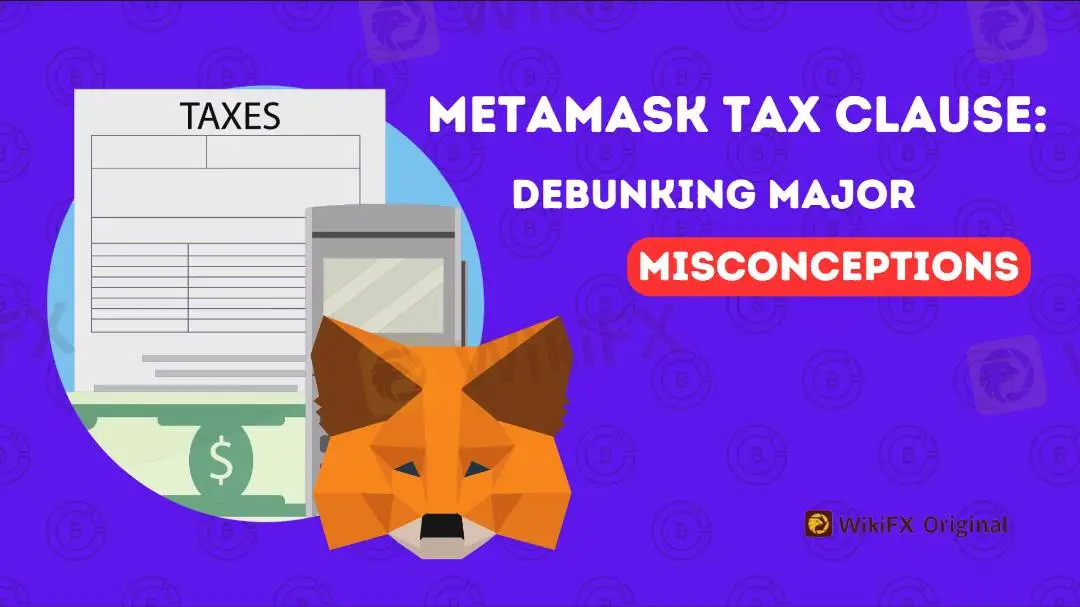简体中文
繁體中文
English
Pусский
日本語
ภาษาไทย
Tiếng Việt
Bahasa Indonesia
Español
हिन्दी
Filippiiniläinen
Français
Deutsch
Português
Türkçe
한국어
العربية
MetaMask Tax Clause: Debunking Major Misconceptions
Abstract:Accointing has recently provided valuable insights regarding MetaMask's tax policies, addressing the confusion among its users.

In response to the recent controversy surrounding MetaMask's updated terms of service and its tax clause, a recent update has been issued to clarify several misconceptions. Accointing, a leading crypto portfolio tracking firm, took to Twitter to shed light on the situation, emphasizing that the MetaMask tax clause specifically pertains to users who make purchases of products or services through the wallet service provider.

To clarify further, individuals who utilize MetaMask solely as a cryptocurrency wallet or for non-commercial purposes, without engaging in any transactions related to purchasing goods or services through the wallet, will not be subject to the taxes outlined in the tax clause.
Accointing also clarified that the tax mentioned in the clause does not pertain to customers' capital gains tax. Instead, it applies to taxes associated with the sale of services conducted between MetaMask users and the wallet provider, typically paid by the party responsible for collecting the tax.
In essence, the statement indicates that the obligation of paying these taxes lies with the entity responsible for collecting them. It implies that MetaMask, being the service provider facilitating the sales of services on its platform, would assume the responsibility of managing and fulfilling the tax payment associated with these transactions.
Various Aspects of Crypto Tax Policies
Tax authorities generally classify certain events as taxable, including the conversion or sale of cryptocurrencies into fiat currency or other digital assets. In some jurisdictions, receiving cryptocurrencies as payment for goods or services may also be considered a taxable event.
Furthermore, the profits or gains obtained from selling or exchanging cryptocurrencies in specific jurisdictions are typically subject to capital gains tax. The tax liability is generally determined based on the discrepancy between the acquisition cost and the proceeds from the sale.
As an example, the 2023 budget proposal in Italy includes a provision that suggests a 26% tax on capital gains derived from cryptocurrency trading. However, this tax would only be applicable if the profits from cryptocurrency exceed 2,000 euros.
Additionally, tax considerations may also arise from crypto mining and staking activities. In certain jurisdictions, the value of newly created or staked coins is considered as income and is therefore subject to taxation. Notably, the White House is urging Congress to include a 30% tax on the electricity costs associated with cryptocurrency mining in the upcoming federal budget.

Disclaimer:
The views in this article only represent the author's personal views, and do not constitute investment advice on this platform. This platform does not guarantee the accuracy, completeness and timeliness of the information in the article, and will not be liable for any loss caused by the use of or reliance on the information in the article.
Read more

Bybit Shuts Down NFT Marketplace Amid Crypto Market Downturn
Bybit announces the closure of its NFT marketplace, citing efforts to streamline offerings. Discover the latest trends in the declining NFT market and its shift to utility-based growth.

Galaxy Digital Settles $200M in Luna Token Manipulation Case
Galaxy Digital pays $200M to settle Luna token manipulation probe by NY regulators, linked to TerraUSD’s 2022 crash, impacting crypto market stability.

Vanuatu Passes VASP Act to Regulate Crypto and Digital Assets
Vanuatu's new VASP Act regulates crypto businesses, enforcing strict licensing, AML/CFT compliance, and investor protections.

Blockchain Decentralization: Empowering a Trustless Future
In recent years, blockchain technology has rapidly evolved from a niche innovation behind Bitcoin into a transformative force across industries. At its core, blockchain decentralization refers to the distribution of authority and decision-making away from a central entity and into the hands of a distributed network of participants. This shift redefines how data is stored and verified and paves the way for trustless, transparent, and resilient systems that challenge traditional centralized models.
WikiFX Broker
Latest News
The Withdrawal Trap: How Scam Brokers Lure Victims into Paying More
FCA to Investors: Think Twice Before Trusting These Brokers
Trump\s tariffs: How could they affect the UK and your money
Trump gambles it all on global tariffs he\s wanted for decades
TradingView Brings Live Market Charts to Telegram Users with New Mini App
Trump tariffs: How will India navigate a world on the brink of a trade war?
IG Group Acquires Freetrade for £160M to Expand UK Investment Market
U.S. March ISM Manufacturing PMI Released
Should You Beware of Forex Trading Gurus?
Vanuatu Passes VASP Act to Regulate Crypto and Digital Assets
Currency Calculator







